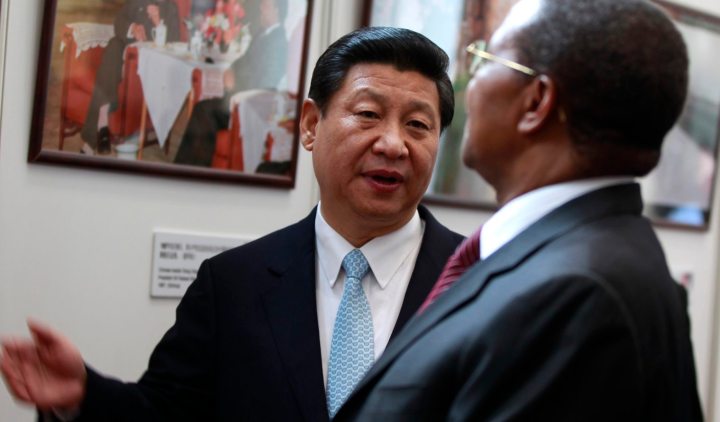Africa
President Xi on China-Africa: it’s business as usual

It’s a telling sign of Africa’s importance to China that new President Xi Jinping made Africa his second international destination (after a brief visit to Moscow). In a keynote speech in Tanzania, Xi re-affirmed China’s commitment to the continent and outlined all the good things the Chinese are doing for us, while brushing away criticism. He’s certainly got more charisma than his predecessor, but no new plans for Africa. By SIMON ALLISON.
Like all good guests, new Chinese President Xi Jinpeng arrived for his first visit to an African country bearing gifts: 19 multi-million dollar contracts for Tanzanian companies and a new, state-of-the-art exhibition centre built in the heart of Tanzania’s commercial capital, Dar es Salaam. It was enough to earn him a fawning welcome from President Jakaya Kikwete, who met him at the airport with an honour guard of soldiers and a troupe of traditional dancers. Kikwete gushed over the new building which, he said, heralded a new dawn for Tanzania’s conference tourism industry.
But observers weren’t too worried about Tanzania’s stagnant hospitality sector when another, much bigger issue was on the agenda: the China-Africa relationship, and whether the ascension of President Xi to the top spot will herald a new dawn in those dynamics?
Prior to Xi’s arrival in Africa, there was no real reason to think so. Yes, Xi is more charismatic than his predecessor, Hu Jintao; he can raise a laugh in speeches and his glamorous wife is drawing instant parallels with the easy grace of Michelle Obama (unusual in a country where “political figures are more frumpy than fashionable and wives usually shy away from the spotlight,” commented AP). But Xi is nothing if not a party stalwart, one of the so-called ‘crown princes’ who have used the power and influence of their politically active parents to secure their own political future. He represents continuity over change,
And so it panned out. In a keynote speech, Xi re-iterated China’s commitment to Africa and talked up his country’s contribution to the continent. He highlighted the $20 billion in loans to be offered to African countries between 2013 and 2015; the $200 billion in bilateral trade between China and Africa in 2012; the 18,000 Chinese medical personnel sent Africa in the last 18 years, treating 250 million Africans; the 30,000 African professionals that China will train and the 18,000 students studying on Chinese government scholarships.
He also worked hard to allay some of the concerns about China’s involvement in Africa: that China is flooding Africa with cheap crap, that it is sidelining African labour, that it is exploiting Africa’s mineral reserves. Shortly before Xi’s arrival, Nigerian central bank governor Lamido Sanusi became the latest high-profile critic of China’s African engagement.
“China takes from us primary goods and sells us manufactured ones. This was also the essence of colonialism,” Sanusi argued. “The British went to Africa and India to secure raw materials and markets. Africa is now willingly opening itself up to a new form of imperialism.”
Xi brushed aside these fears. “China frankly faces up to the new circumstances and new problems in Sino-African relations,” he said. “China has and will continue to work alongside African countries to take practical measures to appropriately solve problems in trade and economic cooperation so that African countries gain more from that cooperation.”
And he was at pains to emphasise that China was not a colonial power. “We get on well and treat each other as equals.” This equal treatment comes, naturally, with the corollary that China asks no questions of its African friends, and expects no questions to be asked of it. “China will continue to offer, as always, necessary assistance to Africa with no political strings attached,” Xi said in a statement that will reassure a number of Africa’s more dubious leaders but should concern anyone who wants China to take a greater role in assisting the continent’s social as well as economic progress.
In other words, it is business as usual for China in Africa, new President or no new President.
His message was well-received by his Tanzanian audience, who applauded frequently during the speech. And Xi’s host, Jakaya Kikwete, was obviously delighted by the fact that his country had been given the singular honour of hosting the new Chinese president. “To us it speaks volumes about the good relationship that exists between China and Tanzania. But also it speaks volumes about the good will that President Xi Jinping has for Tanzania. To us it is something very welcome. We are excited about it,” he told Chinese media.
As a prime beneficiary of Chinese largesse, Kikwete should be excited. Whether the rest of us should share his enthusiasm remains to be seen. DM
Read more:
- China’s promise to Africa: we’ll give you $20 billion and won’t bully you in Tanzania’s Citizen
- ‘Oh boy! So many questions’ about China in Africa in the New York Times
- China’s Xi tells Africa he seeks relationship of equals on Reuters
Photo: China’s President Xi Jinping (L) and his Tanzanian counterpart Jakaya Kikwete (R) look at a Chinese-Tanzanian photo exhibition before the opening ceremony of the Julius Nyerere International Convention Centre in Dar es Salaam March 25, 2013. REUTERS/Thomas Mukoya

















 Become an Insider
Become an Insider